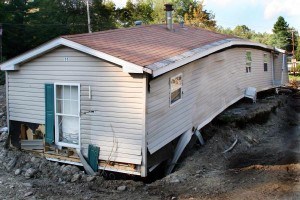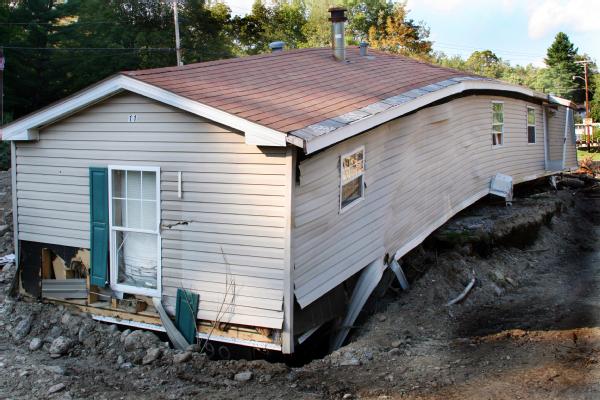The Aug. 28, 2011 flood prompted housing advocates, energy specialists and others to analyze the quality of mobile homes being sold, said Peter Schneider, an energy consultant with Efficiency Vermont.
“Tropical Storm Irene really showed us how vulnerable our mobile home communities are,” he said.

Mobile homes are a critical part of Vermont’s low incoming housing options but they depreciate over time, he told Vermont Public Radio.
“They are poorly built structures for the most part. Many of them are very old structures that people are still living in and they are sort of beyond their life span,” he said.
Mobile home residents also spend a greater portion of their income on energy than other homeowners do, he said.
Now a pilot project is underway in White River Junction to build a more energy efficient and flood-resistant mobile home.
The newly designed home is expected to have about a third of the energy costs of a typical mobile home.
“We’re really well insulated,” said Steve Davis, who is building the first of 10 mobile homes.
They also will be tied to either frost protected piers or to a frost-protected foundation and will not be built on flood plains, said Schneider. “So none of our units are going to be sitting on cinder blocks and up in the air where they could literally float away.”
But the new high-quality homes are more expensive than typical mobile homes, selling for about $90,000, which is roughly $30,000 more than other new mobile homes. That price is justified by the energy savings, said Craig Peltier of the Vermont Housing and Conservation Board, which is offering a $20,000 subsidy on each of the first 10 homes.
Was this article valuable?
Here are more articles you may enjoy.


 Canceled FEMA Review Council Vote Leaves Flood Insurance Reforms in Limbo
Canceled FEMA Review Council Vote Leaves Flood Insurance Reforms in Limbo  Founder of Auto Parts Maker Charged With Fraud That Wiped Out Billions
Founder of Auto Parts Maker Charged With Fraud That Wiped Out Billions  LA County Told to Pause $4B in Abuse Payouts as DA Probes Fraud Claims
LA County Told to Pause $4B in Abuse Payouts as DA Probes Fraud Claims  Portugal Rolls Out $2.9 Billion Aid as Deadly Flooding Spreads
Portugal Rolls Out $2.9 Billion Aid as Deadly Flooding Spreads 